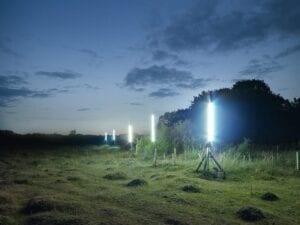One of the main programmes for the 60th International Short Film Festival Oberhausen (1 to 6 May 2014), entitled Memories Can’t Wait – Film without Film, will bring together works that take place in a cinema but play with the normal viewing situation. Many of these works move away from the traditional moving image projection. So what happens in the cinema when the key element of the movie-going experience – the film itself – is taken away, when the screen is blank, when memories are evoked or “impossible films” presented? In one of the most extensive programme of “filmless films” so far, Oberhausen will present over 30 historical and new pieces that explore this question. Film without Film is curated by Mika Taanila, one of the most renowned contemporary Finnish artists and filmmakers. We speak to Taanila about his latest project.
A: Why did you go with the theme Memories Can’t Wait: Film without Film? What is the idea behind it?
MT: The idea is to screen cinematic works that challenge the traditional projection methods. Some of these works don’t even project anything; instead use spoken words, shadows and sounds as main components. It’s fascinating to think about the notion of “a film” and what else can you potentially do in a cinema space than watch a movie passively. I did a single one-off programme called Film without Film for our Avanto Festival, November 2004 in Helsinki. That experience was really nice, we screened for example Ernst Schmidt jr’s Hell’s Angels and zzz: hamburg special by Hans Scheugl, with couple of audio-only films. These programs at Kurzfilmtage are a fantastic opportunity to dig deeper and show a variety of “filmless films”. It’s a strange, beautiful and vibrant sub-genre of experimental cinema.
A: What do you want audiences to take from this section of the film festival?
MT: Many of the films and performances in the programmes are inviting the audience to participate. Not only in the physical sense, like a few pieces do, but mentally to fulfil the cinematic experience. I’ve selected many pieces which can only be shown in a cinema and not online. In this way one important aspect is really to celebrate the cinematic space, the collective unique screening atmosphere. I’m not a huge fan of watching moving image on a smart phone or iPad myself. I hope the audience will be surprised, baffled and maybe even confused by the filmless stuff here.
A: What do you think the benefits of short film are?
MT: I think the greatest freedom in contemporary cinema is in the short film sector. There’s very little commercial pressure, it’s all about art and free-flow of ideas.
A: How did you choose the artists to participate in Memories Can’t Wait: Film without Film?
MT: It’s been a long process. Initially I had an aim that I should have a good balance of historical and unknown – or at least rarely screened – as well as the brand new releases. It’s a combination of my long-time personal favourites and more recent works that I’ve been introduced to by friends. It’s been a pleasant chain of recommendations and totally new discoveries for me. Looking at the final list of 32 artists here, I’m happy that it’s quite an eclectic bunch really. We’re very proud that we’re able to have world premieres for eight pieces.
For more information on the International Short Film Festival Oberhausen visit www.kurzfilmtage.de.
Credits
1. Hans Scheugl, zzz: hamburg special (1968). Courtesy of the artist.





